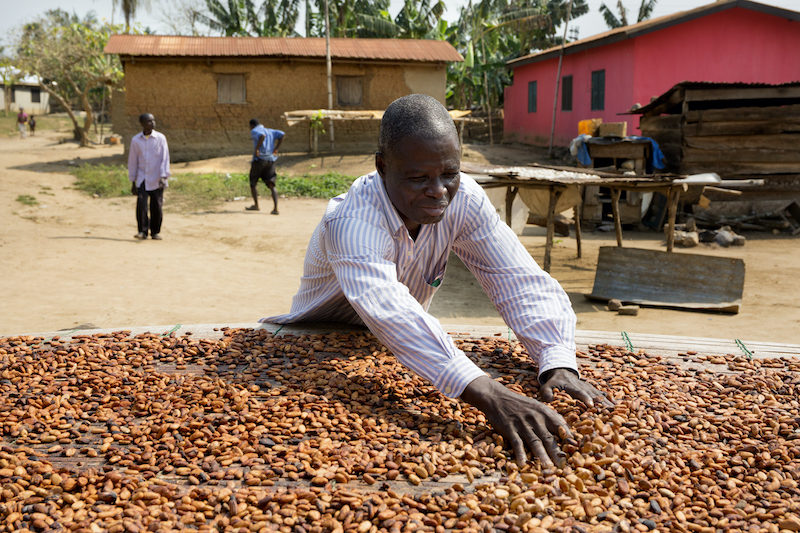Easter industry scorecard raises key concerns over cocoa sector sustainability performance

An industry Easter Scorecard on cocoa sustainability compiled by NGO’s including Be Slavery Free, Green America, INKOTA, Mighty Earth and the National Wildlife Federation has raised key social and environmental concerns over companies’ performance, reports Neill Barston.
According to the findings of the 2021 study, the German-based Storck group, a confectionery with 21 international subsidiaries gained the lowest rating, and was given the “Rotten Egg Award” over a reported lack of responsiveness and transparency. Its well established global brands include Werther’s Original, Riesen, Toffifee, Merci, Colourful World, and Bendicks.
Meanwhile, the scorecard awarded The “Good Egg” accolade to three businesses, US-based Alter Eco with distribution across America and Europe, which was noted for its partner firm Chocolats Halba/Sunray in assisting Alter Eco achieve sustainability goals.
Netherlands firm Tony’s Chocolonely, a Netherlands–based multinational firm (its cocoa farming operations in West Africa picture in main image), received the Good Egg for the second time, with New Zealand business Whittaker’s, also receiving the Good Egg for the second year in a row – with Confectionery Production having recently reported on its key partnership with Rainforest Alliance that led to improving facilities for schoolchildren in Ghana.
As the organisers behind the scorecard noted, previous Rotten Egg “winners” have since substantially improved their performance on sustainability across the board. This included 2020 Rotten Egg recipient Godiva having made major progress on living income policies and its environmental work, as well as 2019 Rotten Egg recipient Sucden achieving gains on all categories of sustainability.
“With this scorecard, consumers in the US, Europe, Australia, New Zealand, Japan, and beyond can buy Easter chocolates from the heart. They now have clear guidance on which companies are shining and which companies’ treats are likely tainted by deforestation and human rights abuses,” said National Wildlife Federation Senior Advisor Etelle Higonnet. “Consumers can now buy chocolate with their eyes wide open and use their purchasing power to push laggards like Storck and reward industry leaders Alter Eco, Tony’s Chocolonely, and Whittaker’s.”
Study methodology
In forming the scorecard, the group of NGO’s surveyed 31 chocolate companies and cocoa suppliers, estimated to be supplying over 80 percent of the world’s chocolate confectionery, including Cargill, Cemoi, Ferrero, Lindt, Mars, Nestle, Mondelez, and Puratos, Ritter and Hershey’s. Several key businesses did not reportedly respond to its study including Unilever, Valrhona and Storck.
The companies that formed part of the study were reportedly scored on the six most pressing sustainability issues facing the chocolate industry: human rights due diligence; transparency and traceability; deforestation and climate change; agroforestry; living income policies; and child labour – the latter being especially crucial in the wake of the NORC at the University of Chicago report highlighting the fact 1.5 million children are exposed to hazardous labour within Ghana and Ivory Coast.
Brands were then placed into one of four categories, with those awarded a green bunny leading the industry on policy, or a red bunny for needing to catch up with the industry. Those companies who chose not to participate in the scorecard also received a red bunny.
Cocoa companies, particularly those in the Cocoa & Forests Initiative, have taken an important step to increase traceability in their supply chains by mapping over one million farms since 2018, and most major chocolate companies have disclosed at least some of their Ivorian cocoa supply chains in Mighty Earth’s Cocoa Accountability map.

“We have seen the most positive progress in the traceability category in recent years,” said Charlotte Tate, Labour Campaigns Director at Green America. “Companies are getting better quickly on this issue, but most still aren’t crossing the finish line. In order to address all other issues in the scorecard, companies must first know where the cocoa is coming from. Without that information, there is little hope of ending child labor, farmer poverty, or deforestation. Companies must have fully traceable supply chains, paired with transparent reporting.”
Besides the traceability trend, the scorecard provides a snapshot on farmer income. “A staggering 180 million wrapped or boxed eggs are purchased for Easter every year. That doesn’t include mini or creme eggs which are huge sellers. Not enough of the chocolate industry’s money goes to countries where cocoa is grown, or to cocoa farmers themselves,” said Fuzz Kitto, Co-National Director of Be Slavery Free in Australia. “Most cocoa farmers earn under $1 per day, with women farmers making as little as $0.30 daily – they are especially hard hit by economic disruption in this pandemic.”
Another trend in the Easter scorecard is the slow but steady improvement of Japanese companies on certain sustainability metrics over the past four years. However, Japanese chocolate companies still need stronger policies with monitoring and enforcement to end child labor, poverty and deforestation in their cocoa supply chains. The Japanese sector must evolve quickly to avoid underperforming relative to its global peers. The creation of a new “cocoa platform” launched by the Japan International Cooperation Agency (JICA) in 2020 could be the key to address sustainability problems industry-wide by bringing together government, industry, and non-profits.
“The scorecard also shows that the pace for adopting agroforestry and more climate friendly farming practices is much slower than required,” said Samuel Mawutor, Senior Advisor at Mighty Earth. Transforming the cocoa sector from the problematic monocultures cannot be possible without a stronger focus on forest and farm restoration through agroforestry. He notes that “companies need to transition from tree seedling distribution and invest many more resources into growing and nurturing planted trees on cocoa farms and tree tenure security to ensure the uptake of agroforestry at scale across West Africa.”
“This scorecard sets the record straight on greenwashing versus real action,” said Johannes Schorling, Campaign Coordinator at INKOTA. “Despite decades of voluntary industry commitments, poverty, hazardous child labor, and deforestation are still widespread in the cocoa sector. Most companies have only started to carry out due diligence, and many gaps remain. This corporate underperformance shows that we need robust due diligence legislation. The full results of the scorecard can be seen here.



